- Home
- Thomas H. Cook
Blood Innocents Page 17
Blood Innocents Read online
Page 17
Reardon looked up. “Who?”
“Some old lady,” Piccolini said. “She telephoned and the canvass went over to her home to ask some questions.”
It was clear to Reardon that Piccolini was excited by the prospect of an eyewitness. Piccolini was really losing his reason over this case, Reardon thought. Anyone could say they were a witness to anything, but were they? And if so, what had they seen? And how well had they seen it? Nobody really had a witness until they had sufficient answers to those questions. He wondered why Piccolini had forgotten that. “What did she see?” he asked.
“She saw the man who killed the fallow deer.”
“She’s sure?”
“Yes,” Piccolini said, smiling broadly.
“Did she describe him?” Reardon asked.
“I didn’t go into that, but if it’s Petrakis she saw, then that’s it. No more nonsense. That’s a conviction. Anyway, get over there.” He handed Reardon a piece of paper on which he had written the name and address of the witness:
Mrs. Eleanor Lassiter
203 East 69th Street
“Take a picture of Petrakis with you. She may be able to make a tentative identification from the photo.”
“All right,” Reardon said. He rose and began to put on his overcoat.
Piccolini rubbed his hands together eagerly. “The folks downtown are going to be real happy about this.”
“Did you tell Van Allen yet?”
“Not yet,” Piccolini replied. “Why?”
“Hold off a while.”
Piccolini smiled, “Okay, I’ll do that.”
“Good,” Reardon said.
“Just don’t forget to take a picture of Petrakis. And call me the second she makes the identification. I want to know right away.”
Reardon was getting a little weary of being instructed like a rookie. “All right,” he said.
“This will tie it up,” Piccolini said jubilantly. “I can just feel it. We got this case in the bag.”
As he turned to walk back to his office Piccolini slapped Reardon affectionately on the back, as if they were old buddies again, fellow travelers on Saint Crispin’s day: We few, we happy few, we band of brothers.
Reardon took a picture of Andros Petrakis and slipped it in one of his coat pockets. He suspected that Piccolini was right, that within the next few minutes Petrakis would either be convicted or cleared. Before now he had hoped for another witness as the only means of exonerating Petrakis. But now he had his doubts: the witness might identify Petrakis.
He stopped at a sidewalk newsstand to get a paper and was surprised to find that the Daily News was still carrying the killing of the fallow deer as its lead story. He turned to page two and was confronted once again with the faces of the three Van Allens and Andros Petrakis. He folded the paper back and read the story as he walked. There was nothing new. The killing was reiterated in one column. In another the activities of the Van Allen family in New York were traced through the previous fifty years. Another story related how the killing of the fallow deer had been held back by the press until a “suspect” was apprehended. Reardon tucked the newspaper under his arm. By this time tomorrow, he thought, he would be reading the story of the woman who saw the fallow deer slaughtered.
The closer he came to Mrs. Lassiter’s address, the slower he walked. He did not want to interview her, and he knew it. If she identified Petrakis, then Reardon knew he had discredited himself, that he had trusted a feeling and the feeling had betrayed him. More importantly, it would mean that Petrakis had no hope of clearing himself, and even now Reardon could not believe that that insensible shadow of a man could possibly have roused himself to the brutal frenzy which the killing of the fallow deer required.
But if she could not identify Petrakis it would only mean that the case must be continued, and it had already exhausted Reardon like a fever. He knew that he had burned himself out on this case, lost the spirit of pursuit, the perverse energy of the chase itself. He had never had enough of that hunting instinct. But now even that animal vitality — the glint in the eye of the bird of prey — had fled him. He had no more questions left for Cain.
203 East 69th Street was a brownstone. It was clear to Reardon immediately that whoever the witness was she was a person of considerable means. It did not surprise him that a servant greeted him at the door.
“May I help you?” the woman asked. She was a small black woman dressed in a nurse’s white uniform. She had a slight Jamaican accent.
“I’m Detective John Reardon, New York City Police Department.” Reardon displayed his gold shield.
“I believe Mrs. Lassiter is expecting you. Won’t you come in?” The woman opened the door and stepped back to let Reardon enter. “Would you mind waiting a moment?” she asked, and disappeared through a hallway adorned on both sides with paintings.
Looking around him Reardon realized that he had never seen a home so beautiful. Even the Van Allen penthouse lacked this subdued elegance. It was stately, even reverent. Everything — every book, piece of furniture and glass inlay — looked as though it had been carefully wrought by hands trained in a more patient age.
“Mr. Reardon?” a voice said.
Reardon felt as though he had been wrenched from a brief reverie. He turned around in the direction of the voice. “Yes?”
“Mrs. Lassiter is in her garden,” the black woman said. “She would prefer meeting you there.”
“That would be fine,” Reardon said.
She conducted Reardon through the hall of paintings and out into a small, shaded Japanese rock garden surrounding a shallow, irregular pool. Water trickled through a bamboo pipe, over a large stone and into the pool.
“This is Detective Reardon,” the woman said to Mrs. Lassiter.
“Won’t you sit down?” Mrs. Lassiter asked.
“Yes, thank you,” Reardon said. He sat down in a small rattan chair. “This is a lovely garden.”
“It’s pleasant,” Mrs. Lassiter replied, “but it is not Heaven.” She was bundled up in a heavy blue coat which complemented the grayness of her eyes. Her head was covered by a thick wool shawl and her hands were tightly clothed in brown suede gloves. She sat in a large white wicker chair near the center of the garden. She was very old, or so she appeared to Reardon. The hair that crept out from underneath the shawl was white. Still, her face retained a beauty that Reardon guessed had once been extraordinary.
“You are here about the deer, I suppose?” she said.
Reardon laid the newspaper on a table that stood between himself and Mrs. Lassiter and took out his notebook. “I understand that you have some information which might help us.”
“Yes,” Mrs. Lassiter said, “I have.”
Reardon nodded for her to proceed, but she did not. Instead she said, “I’m sorry that I could not receive you inside.”
“That’s all right,” Reardon said.
“It is difficult for me to move,” Mrs. Lassiter explained. She glanced at her gloved hands. “I have very severe arthritis. There are times when any movement is extremely painful for me.”
“I’m sorry,” Reardon said.
“I don’t like to receive guests in the garden,” Mrs. Lassiter continued. “It never seemed to me to be a proper place.” She smiled. “Especially so late in the fall.”
“I wouldn’t worry about it,” Reardon said.
“Perhaps not,” Mrs. Lassiter said. “Things are much more casual now than when I was a girl. Things were very formal then, you know. Such formality is thought to be rigid now. My grandchildren, for example, are most informal in everything.”
“I see,” Reardon said, letting her go on, work herself up to what she had seen — if, in fact, she had really seen anything.
“Most informal,” Mrs. Lassiter repeated. She paused. “Are you married?”
“I was married,” Reardon said.
Mrs. Lassiter lowered her eyes. “Oh, divorced,” she said quietly.
“No,” Reardon ex
plained, “my wife died.”
“Oh,” Mrs. Lassiter said, “I’m sorry.”
“It’s quite all right,” Reardon said.
“Divorce is very prevalent now,” Mrs. Lassiter said, looking somewhat apologetic.
“Yes, it is.”
“A shame, I think,” Mrs. Lassiter said, “families breaking up like that. Sacred covenants broken.” She paused to watch a small breeze skirt a flank of dead leaves across the garden. “Were you married only once?”
“Yes.”
Mrs. Lassiter nodded approvingly. “Any children?”
“One,” Reardon said, “one son.”
“I see,” Mrs. Lassiter said. “I have two daughters. They —”
“Mrs. Lassiter?” Reardon interrupted. It was time, now, to move on.
“They have both been married,” Mrs. Lassiter continued, undeterred. “Now they’re both divorced. I suppose that’s the way things are now.”
Reardon was beginning to wonder if Mrs. Lassiter had seen anything at all. He remembered all the times before when lonely people had called the police with no more justification than a desire to talk to someone — anyone — about anything. The falsely reported burglaries, noises, assaults outside their doors, faces reflected in late-night window-panes. Reason suspected that Mrs. Lassiter might identify anyone, any photo that he showed her.
“Mrs. Lassiter,” Reardon began again, “about the deer …”
“Oh, yes,” Mrs. Lassiter said. “Of course, that’s why you’re here. Forgive me for my digression.” She smiled faintly. “It is said to be a prerogative of old age.”
“One of our officers reported that you had information that might be of help to us.”
“Yes,” Mrs. Lassiter said, “I have.” Her voice was full of authority, and Reardon could not doubt that she, herself, did at least believe that her information was important.
“Can you tell me?” he asked politely.
“Of course,” Mrs. Lassiter said. Painfully, she shifted a bit in her seat. “I was in the park when the deer were killed.”
Reardon jotted down her first statement in his notebook. “I see.” He looked up at Mrs. Lassiter. “About what time was that?”
“I’m not sure.”
“You’re not?” Perhaps she had not seen anything at all, he thought, if she did not know the time of the crime.
“It was sometime in the early morning.”
“I see,” Reardon said. “Which morning?”
“Monday morning, a week ago Monday morning.”
Reardon noted her response down in his notebook. Everything she had said so far, he thought, had been in the newspapers. “Do you have any idea when on Monday morning you were in the Children’s Zoo?” Point by point he expected the credibility of her story to disintegrate. “Had the sun come up, do you remember? Was it after dawn?”
“No,” she replied firmly. “It was not. It was still very dark. I am sure of that.”
“I see,” Reardon said.
“It was very dark,” Mrs. Lassiter repeated, “except, of course, for the lights that illuminate the zoo at night.”
“Of course,” Reardon said, looking up. “So you were in the Children’s Zoo early Monday morning, before daylight. Were you alone?”
“Yes.”
“You were alone in the Children’s Zoo at that hour?” Reardon asked again, and it was clear that he doubted it.
“Yes,” Mrs. Lassiter said authoritatively, “I was.”
“Why?”
Mrs. Lassiter did not answer.
“It’s kind of unusual,” Reardon said, “for anyone to be in the park at that hour.”
“Yes,” Mrs. Lassiter said, looking away, “I suppose it is.”
“Could you tell me why you were there?”
“That is very personal,” Mrs. Lassiter said.
“If it has no bearing on the case,” Reardon assured her, “then anything you say is confidential. I promise you.”
Mrs. Lassiter bowed her head. “I don’t know if I can,” she said.
Reardon leaned toward her. “Mrs. Lassiter, I have been a policeman in New York for about thirty years.”
Mrs. Lassiter looked up and smiled. “I suppose you have heard or seen every possible wickedness?”
“Yes, I think so,” Reardon said.
Mrs. Lassiter’s face relaxed but her lower lip began to tremble. “Have you ever been in great pain?” she asked.
“Physical pain?” Reardon asked. “No. No, I haven’t.”
“Look at my hands,” Mrs. Lassiter said.
Reardon looked down at Mrs. Lassiter’s hands. They were curled delicately around the arms of her chair. He could guess what they looked like under the gloves.
“I cannot straighten my fingers,” she said. “There are days when I cannot move at all because the pain is too great. There are days when I cannot raise a fork to my lips to feed myself, and so I have to be fed and my mouth has to be wiped like an infant.”
“I see,” Reardon said. He could feel a tension building in his own hands, tightening his fingers.
“Do you?” Mrs. Lassiter asked. “I don’t think you do.”
“It’s your arthritis?” Reardon asked.
“Yes,” Mrs. Lassiter said, and she stared at him with a face as full of rage at the awesome humiliation of her distress as Reardon had ever seen. “There are times when I can do no more for myself than the tiniest infant. Times when I cannot clean myself.”
Reardon leaned back in his chair and tried to relax the rage he felt might rise in him at any moment. He wanted to lift her up, fold her in gossamer, and send her to the place where earthbound things have wings. But he could not even speak.
Mrs. Lassiter was silent for a moment. She sat, lips trembling, trying to compose herself. “But that does not really tell you what I was doing in the Children’s Zoo before dawn on a Monday morning,” she said finally.
“No,” Reardon admitted, “it doesn’t.”
“I don’t want to live like this,” Mrs. Lassiter said.
Reardon nodded. He felt helpless, unable to do anything else.
“Are you a Catholic, Detective Reardon?” she asked.
“In a way.”
“An apostate?”
“In a way,” Reardon said again.
“But you are enough of a Catholic to know that in our faith suicide is a mortal sin?”
“Yes.”
“All my life,” Mrs. Lassiter said, “I have been a devout Catholic.”
Reardon nodded.
“A practicing Catholic,” Mrs. Lassiter added.
“Yes,” Reardon said.
For a moment Mrs. Lassiter could not speak.
Reardon waited, then he urged her on. “A practicing Catholic,” he said.
“Yes,” Mrs. Lassiter said, “a devout and practicing Catholic who cannot bear to live anymore.”
“I see,” Reardon said.
“Have you ever heard the story of David and Uriah?” Mrs. Lassiter said.
“No.”
“King David in the Bible? And Uriah?”
“No.”
“Well, Uriah was a soldier in the army of Israel. He had a beautiful wife, and David wanted her for himself. But David did not believe in adultery. And he did not believe in outright murder. So he sent Uriah to the most deadly position in a battle, and Uriah was killed there.”
Mrs. Lassiter looked at Reardon. “Do you know what I mean?”
“I’m not sure,” Reardon said.
“I am David,” Mrs. Lassiter said.
“David?”
“And Uriah,” she added.
Then Reardon understood why Mrs. Lassiter had been in the Children’s Zoo so early on a Monday morning. But he did not know what he could say or do in response to that knowledge. Quickly he leaned forward and picked a dead leaf from Mrs. Lassiter’s lap and dropped it soundlessly into the pool beside her.
“I want to die but I cannot kill myself,” Mrs. Lassiter said, “so I
go to dangerous secluded places.”
It seemed to Reardon that a wave of relief passed over her with that final, direct admission. “Like the Children’s Zoo?” he asked.
“Yes.”
“I’m sorry.”
“Thank you,” Mrs. Lassiter said.
Reardon noted how quickly she had regained her composure. It was obvious to him that she neither needed nor wanted pity; what she wanted was to die, to be done with it. In the meantime she would carry on as best she could.
“You may continue your questions, Detective Reardon,” she said.
“Why don’t you just tell me what you saw?” Reardon said, exhausted.
Mrs. Lassiter nodded politely. “I was walking down the sidewalk which runs near the elephant cages and into the plaza behind the main building, the one at the Fifth Avenue entrance to the zoo. I had been walking all about the park that evening. I had not seen many people. As I said, I am not sure of the time.”
“Yes, go on.”
“Well, as I reached the southern corner of the main building, I saw a man running toward me with an ax in his hand. He was covered with blood. He was looking behind him as he ran, and it was not until he was almost on me, not more than a few feet away, that he turned forward and saw me.”
“And you saw him?” Reardon asked.
“Very clearly,” Mrs. Lassiter said, “and I have never seen a face so full of fear. I thought for a moment that he must have been attacked himself. The way he looked so frightened, the way he was running, looking behind him.”
“What did he do when he saw you?”
“He stopped. And he just looked at me,” Mrs. Lassiter said. “I thought he was going to collapse at my feet and beg me to protect him. He was weeping, you see. Crying so hard that his whole body was shaking.”
“Crying?”
“Oh, yes,” Mrs. Lassiter said, “very definitely. I have no doubt of that. He was crying, almost convulsively. We were standing on the sidewalk. It was well lit, and I saw him as plainly as I could see you in this garden if you were a few feet distant. Then he turned and ran in the other direction.”
“Which direction?”
“He ran directly north, away from me. Then he turned and disappeared behind the main building. Toward the stairs that exit the park onto Fifth Avenue.”
Reardon jotted this down in his notebook. “What did he do with the ax?”

 The Interrogation
The Interrogation Sacrificial Ground
Sacrificial Ground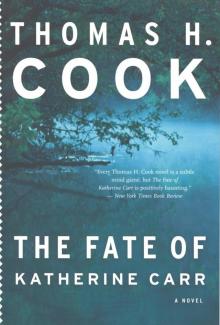 The Fate of Katherine Carr
The Fate of Katherine Carr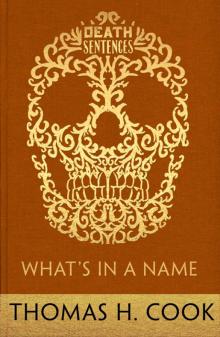 What's In A Name
What's In A Name Blood Innocents
Blood Innocents Peril
Peril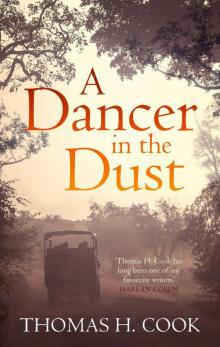 A Dancer In the Dust
A Dancer In the Dust Breakheart Hill
Breakheart Hill The Chatham School Affair
The Chatham School Affair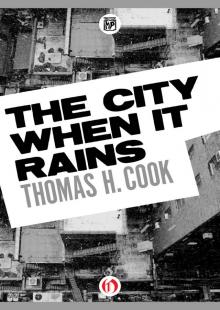 The City When It Rains
The City When It Rains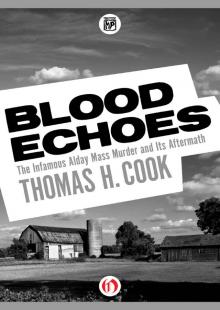 Blood Echoes
Blood Echoes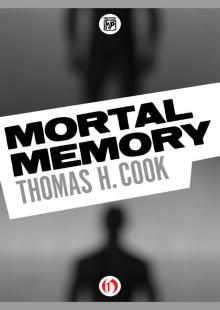 Mortal Memory
Mortal Memory Evidence of Blood
Evidence of Blood Into the Web
Into the Web The Crime of Julian Wells
The Crime of Julian Wells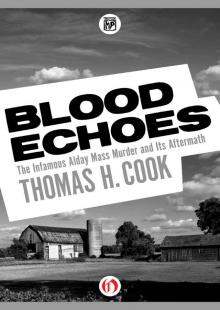 Blood Echoes: The Infamous Alday Mass Murder and Its Aftermath
Blood Echoes: The Infamous Alday Mass Murder and Its Aftermath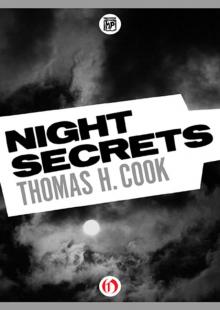 Night Secrets
Night Secrets Places in the Dark
Places in the Dark The Orchids
The Orchids Elena
Elena Streets of Fire
Streets of Fire Instruments of Night
Instruments of Night Sacrificial Ground fc-1
Sacrificial Ground fc-1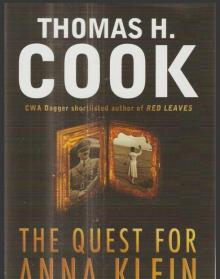 The Quest for Anna Klein
The Quest for Anna Klein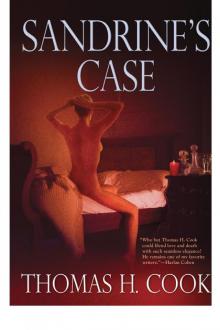 Sandrine's Case
Sandrine's Case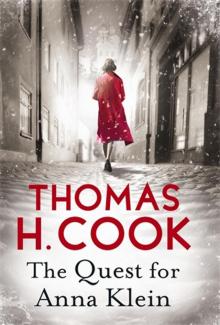 Quest for Anna Klein, The
Quest for Anna Klein, The Fatherhood
Fatherhood Flesh and Blood
Flesh and Blood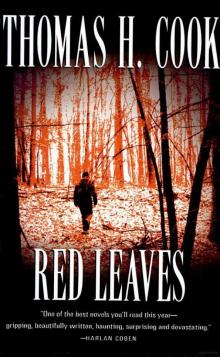 Red Leaves
Red Leaves